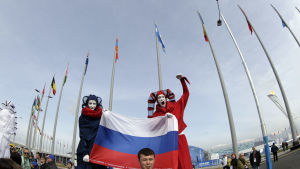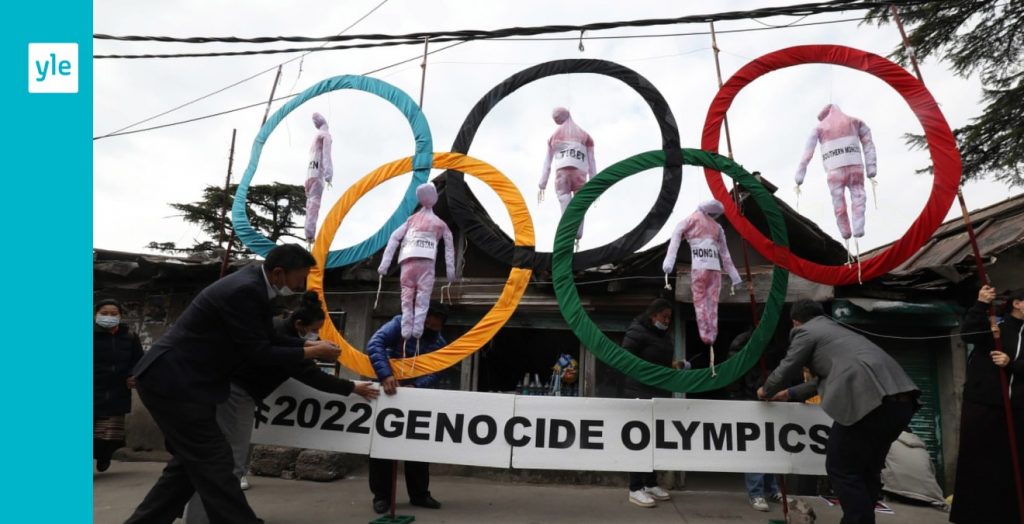Several countries in the West, including the United States, Canada and Australia, are considering boycotting the Beijing Winter Olympics next year, due to the genocide of Uyghur Muslims and China’s attempts to weaken democracy in Hong Kong and Taiwan.
The boycott speculation was caused by 180 civil society organizations signing a joint statement calling for a boycott of the Beijing Winter Olympics, which will begin in less than a year, on February 4, 2022.
Civic organizations representing Uyghurs, Tibetans and persecuted Hong Kong are calling for the boycott.
They refer to what they see as the genocide of Uyghur Muslims in Xinjiang and call on the outside world to boycott the Winter Olympics, “because the games cannot be used to encourage China to abhor heinous human rights violations and suppress dissidents.”
Sadly, history repeats what happened 82 years ago with the 1936 Nazi Olympics
The organizations assert that more than a million Uyghurs have been forced to live in so-called “retraining camps” where they are subjected to brutal human rights violations, forced labor and forced indoctrination. Uyghur females also testify to forced sterilization and rape while being held in these camps.
Therefore, one of the 180 organizations, the World Uyghur Congress, calls the Beijing Olympics the “Genocide Olympics”.
Other organizations also point to China’s ongoing efforts to crush democracy and self-rule in Hong Kong, as well as China’s aggressive stance on Taiwan and other South China Sea countries involved in border conflicts with China.
The Student Group in Exile for a Free Tibet compares the Beijing Winter Olympics with the Summer Games in Berlin and Nazi Germany in 1936.
Tibetan activist Dorje Tsetin said, “It is unfortunate that history repeats what happened 82 years ago with the Nazi Olympics in 1936. The Olympic Games in Berlin helped justify the genocide of the Jews and the consolidation of Nazi rule.”
So critics of the Olympic Games demand that the Winter Olympics be moved to another country and another city, despite the fact that no one has registered their interest in such a short notice.
180 NGOs call for a boycott of the 2022 Beijing Winter Olympics.
180 NGOs call for a boycott of the 2022 Beijing Winter Olympics.
Photo: EPA-EFE / WU HONG
Boycotts are not driving anyone anywhere
IOC Vice President Dick Pound rejected the boycott demands, saying “it will have no effect whatsoever.”
The games are not Chinese games but the games belong to the International Olympic Committee. The decision to host China does not mean endorsing the government’s position, the longest-serving member of the International Olympic Committee who has championed the decision to host China in both the 2008 Summer Olympics and the 2022 Winter Olympics asserts.
Where would the Olympic Games be celebrated with such a critical stance, Pound asked?
For its part, China has consistently rejected all criticism of the treatment of Uyghurs and Tibetans. Foreign Minister Wang Yi even described the country’s treatment of minorities as “a shining example of how human rights have progressed in China.”

Vice President of the International Olympic Committee Dick Pound rejects criticism of the Beijing Winter Olympics.
IOC Vice President Dick Pound has rejected criticism of the Beijing Winter Olympics.
The United States and Canada are considering boycotting the Olympic Games
Rumors of an impending boycott intensified in early April when State Department spokesman Ned Price confirmed that the United States had consulted with close allies about the need and willingness to organize a boycott.
This is something we are definitely discussing with our allies. Coordinated action is not only in our interest but also in the interest of allies. Price stated that this is something that is on the agenda now and in the future.
Only a few hours later, the statement was withdrawn when the State Department stated that “we have not, nor are we discussing, at best a coordinated boycott.”
However, several countries have already made decisions that could be seen as preparations for a boycott. For example, the parliamentarians of the Netherlands and Canada condemned the treatment of Uyghurs as genocide.
In Canada, 166 members of the House of Representatives voted in favor of the motion calling for the International Olympic Committee to bar China from hosting the Winter Olympics, and no proposal was opposed.
The unanimous condemnation in Canada was preceded by a breakdown in relations with China. This was the result of the arrest of Huawei CEO Meng Wanchou at the request of the United States, who demanded her extradition.
China retaliated by detaining two Canadian citizens who were brought to justice for espionage, despite the fact that no detailed charges have yet been brought.
Australia and the United Kingdom leave the door open
In Australia, a similar boycott proposal was not implemented as the majority of Conservative government members abstained from the vote, possibly for fear of further deteriorating bad relations with China.
The vote in Australia can also be explained by the fact that Brisbane is considered the favorite for the Summer Games in 2032, and that the Conservative government does not want to harm the city’s Olympic projects.
British Foreign Secretary Dominic Raab said that Britain, which had also condemned the treatment of Uighurs as genocide, had so far left the door open for a boycott.
Many global companies are also under intense pressure, partly from boycott activists and partly from China, threatening countries and companies to boycott with tough countermeasures.
Foreign companies with operations in China were concerned about how China would take drastic measures against H&M after the Swedish clothing company criticized human rights conditions in growing cotton in Xinjiang.
It is therefore expected that most of the multinational companies, which have interests in China, will participate in the Winter Olympics in various ways. This is something boycott opponents have used as an argument for athletes to participate as well.
The argument goes: Why are athletes forced to sacrifice years of hard work if large multinational corporations can continue to make huge profits in China.
An entirely different case is that athletes are forced to silence themselves according to International Olympic Committee Rules No. 50, which prohibits athletes from protesting or demonstrating in Olympic arenas.
Athletes cannot influence the rules of participation in the Olympics, but they are to blame if they do, as Rob Kohler complains of the Global Athlete interest group.
The voices of the athletes must be heard, so we call for the abolition of rule 50.

The United States and its allies boycotted the 1980 Moscow Summer Games after the Soviet Union invaded Afghanistan.
The United States and its allies boycotted the 1980 Moscow Summer Games after the Soviet Union invaded Afghanistan.
Photo: ullstein bild – Sven Simon / All Over Press
Boycott of all kinds
Many still remember how the United States and a number of Western countries boycotted the Summer Olympics in Moscow in 1980 after the Soviet Union invaded Afghanistan.
The Soviet Union and its allies responded four years later by boycotting the 1984 Los Angeles Summer Olympics (Finland did not participate in Moscow or Los Angeles County).
Olympic boycotts are often used as evidence that boycotts lead nowhere and have little influence on state behavior. For example, the Soviet Union stayed in Afghanistan for nine years, despite the US-led boycott the year after the invasion.
However, few remember how the United States and Germany led the so-called diplomatic boycott of the Winter Olympics in Sochi in 2014.
This means that neither the United States nor Germany has sent an official delegation to Sochi, and that President Barack Obama and Chancellor Angela Merkel did not attend the Winter Olympics.

Among other things, the United States and Germany declared a diplomatic boycott of the Winter Olympics in Sochi in 2014.
A performer in the region
Bild: Tommy Hanenen
The Eurasia Risk Analysis Group, which has studied different types of provinces, believes that a similar diplomatic boycott could be achieved next year in Beijing, the first and only city to host both the Summer and Winter Games.
The 2008 Summer Olympics in Beijing preceded the demands of a boycott due to human rights violations in Tibet, but there was no diplomatic or other boycott. Finally, the heads of state and government of more than 80 countries participated in the opening ceremony, which was a new record.
Eurasia calculated that the chances of a diplomatic boycott this time are as high as 60% and that the list of potential boycott is topped by countries such as the USA, Canada, Great Britain and Australia. On the other hand, the Asian allies of the United States, Japan and South Korea are unlikely to join even the diplomatic boycott, which is one of the mildest forms of a boycott.
An athlete’s boycott is also unlikely, and the chance of that is 30 percent at most, according to Eurasia. In the United States, for example, Senator Mitt Romney called for an economic boycott rather than forcing athletes to stay indoors without their guilt.
Mitt Romney, who was the director of the Winter Olympics in Salt Lake City in 2002, suggests that American spectators stay home and that American television companies and other companies do not contribute to the Olympic Games in Beijing.
Many of Romney’s Republican party comrades want to go much further. Senators Marco Rubio and Rick Scott have criticized the US media companies that bought the broadcast rights for the Olympics, accusing them of prioritizing their financial gains over human rights.
Sources: The Diplomat, CNBC, The Financial Times

“Extreme tv maven. Beer fanatic. Friendly bacon fan. Communicator. Wannabe travel expert.”







More Stories
Brexit brings economic uncertainty – Finland worst hit in the long run – Hufvudstadsbladet
Britain wants closer ties with the European Union.
Britain may already be out of recession